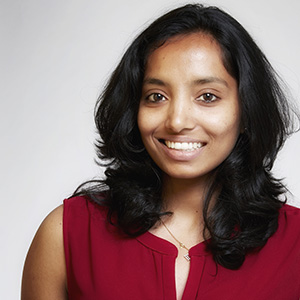Vandana is a Scientia Fellow who aims at addressing the relationship between selected cancers and viral infections and designing treatment strategies specific to that cancer type using complex network approaches.
We talked with her about her project, the Scientia Fellows programme and the benefits of experiencing different cultures and research environments.
What is your research focus?
In a biological system, the normal functioning of the cells is governed by various entities, like genes, proteins and environmental factors, which function in association with each other. Thus, to understand complex diseases, like cancer, it is important to study the system holistically rather than in isolation. I use mathematical modelling, specifically complex network analysis, to represent systems that have a sense of interconnectedness, similar to social networks formed by relationships between friends and families.
Cancer and other complex diseases annually cause millions of deaths worldwide. Viruses are involved in the pathogenesis of many of these diseases, including cancers. Understanding the complex interactions and correlations are crucial to developing better treatment for cancer and viruses.
Getting to know different cultures
Vandana is also interested in social interaction and emphasises the opportunity to learn about different cultures, people and research environment was one of the reason to apply to Scientia Fellows.
“In my experience it broadens your perspective and will further enhance your career and development as a person. For example, in Glasgow, I got involved in different outreach activities to explain research and its importance to people working outside academia. If I stayed in India, I probably might not have explored this opportunity. Now, I am involved with a Facebook group reaching out to non-scientists in India.
Scientia Fellows also gives you the opportunity to design your own research project and a quality stamp as a Marie Curie fellow. You have proved that you can plan your project, foresee risks, follow through on your project and are able to communicate it in an understandable way. That positions you to receive other EU funding further down your career path.”
How did you learn about Scientia Fellows? Did you experience any hurdles coming here?
I received a Royal Society-SERB Newton International fellowship and worked in Glasgow for two years after finishing my PhD in India. My work at the University of Glasgow was focused on viruses, and my interest in seeing it in connection to cancer grew. In Glasgow I worked with professor David Roberston. When I was exploring for a new fellowship, I contacted professor Tero Aittokallio at the University of Helsinki. As he was moving to the University of Oslo, he gave me the opportunity to apply for the Marie Curie-fellowship. When Scientia Fellows opened up for applicants, I wrote a project with Tero Aittokallio and Arnoldo Frigessie and the same was accepted.
I was to join University of Oslo in May, but due to the pandemic (lockdown) could not join before August. There were some problems with practical issues like my entry visa expired before I could arrive, so I had to let my original housing go. ISMO, the office for international staff, was really helpful with everything so I overcame the problems quite easily and arrived in Oslo in August.
With a firm foot in different fields
Her research group, Oslo Centre for Biostatistics and Epidemiology, is based at the University of Oslo and the Oslo University Hospital. Her dual position with the biostatistical experts at the university and the more biological focused colleagues at the hospital, perfectly fits Vandana`s background. She started out as an undergraduate in chemistry, botany and zoology, took a Master`s in bioinformatics, and combined them in her PhD and postdoc fellowship.
“I am glad to be able to do my own project in a multi-disciplinary research environment, where one of the common objectives is to find individualised treatment options for cancer patients based on multi-omics biomarker panels. Now, I have three years for my project and also attend courses within the postdoctoral programme at the university and School of Health Innovation. I have taken the first module of the postdoc course on leadership and am interested in the School of Health Innovation to receive support when exploring into the innovative and entrepreneurial potential in my research. Understanding the complexity of diseases is crucial and can deeply impact the way various diseases are treated using drug repurposing strategies. Today, we see that medicines used in the treatment of other diseases like cancer have been the foundation to develop treatments for corona patients.”
What are your future plans?
I plan to apply for ERC funding as an independent PI or project leader after gaining experience. I am also looking into innovation opportunities. Scientia Fellows is an important step towards that goal, giving me the experience in planning my own project, research skills, and a course in management and innovation. I also think a proven record of qualifying for EU funding helps in the ruthless competition for the grants.
Read about Scientia fellow Filipa Baltazar da Costa Vaz here
